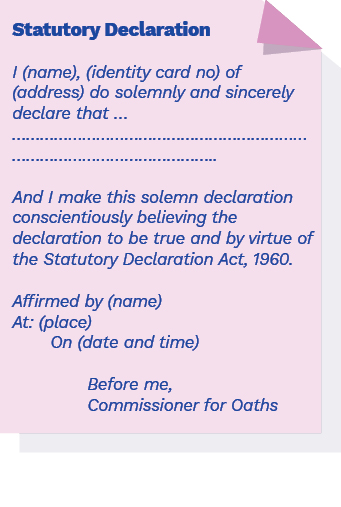
Statutory declarations are commonly used for procedural matters. For example, a first-time house buyer would be required to submit a statutory declaration to say that he does not own a house to be entitled to the benefit of a unit in a low, medium or affordable housing category. Another example would be where a business licence applicant may need to attest that he is not declared bankrupt.
The basic purpose for a statutory declaration is to obtain confirmation of execution of any deed, written instrument or allegation or proof of debt which would otherwise be too impossible to prove. In other words, it is to provide written proof to confirm something either too tedious or impossible to verify.
In a contractual context, if a person made an ordinary statement which turned out to be untrue, this would merely amount to misrepresentation and that would constitute a breach of contract which could lead to civil action. On the other hand, if a person made a false statement by way of statutory declaration, apart from being a misrepresentation, it would be tantamount to a criminal offence under the Penal Code and such person could be prosecuted.
A sample scenario would be if a managing director of a housing developer swore a statutory declaration that his company would abide by the bumiputera quota imposed by the State Authority’s policies and not deviate from the process, but somehow, at a later stage, the company oversold the bumiputera quota to non-bumis, he would have committed a wrongdoing.
Punishable by jail and fine
The law that governs statutory declarations in Malaysia is the Statutory Declaration Act 1960 (SD Act). The SD Act requires the documents requiring statutory declarations to be sworn or declared its accuracy and truth with no elements of misrepresentation.
In Malaysia, the Notary Public or Commissioner for Oaths may take and receive any declaration voluntarily made in Malay or English in an appropriate form, as pursuant to Section 2 of the SD Act. A person making a declaration by this SD Act shall pay a fee to the officer or Commissioner taking the declaration.
The SD Act further provides penalties against people who make false declarations pursuant to Section 3 of the SD Act. These punishable sections are laid down under Section 199 and Section 200 of the Penal Code.
Section 199
Whoever, in any declaration made or subscribed by him, which declaration any Court, or any public servant or other person, is bound or authorised by law to receive as evidence of any fact, makes any statement which is false, and which he either knows or believes to be false or does not believe to be true, touching any point material to the object for which the declaration is made of used, shall be punished in the same manner as if he gave false evidence.
Section 200
Whoever corruptly uses or attempts to use as true any such declaration knowing the same to be false in any material point, shall be punished in the same manner as if he gave false evidence.
In essence, the SD Act states that people who make a false statutory declaration will be charged and shall be punished with imprisonment for a term which may extend to seven years and shall also be liable to a fine.
How to word a statutory declaration
All statutory declarations must contain the following wordings.

Prudence dictates that a declaration must be made in compliance with the said SD Act. A declaration is not a declaration within the meaning of Section 199 of the Penal Code if there is an omission.
In the case of Yeoh Oon Theam v Pendakwa Raya [2016] MLJU 406, the Court of Appeal held that the statutory declaration is not within the meaning of the SD Act. The panel of judges, comprising the Honorary Justice Tengku Maimun binti Tuan Mat, The Honorary Justice Vernon Ong Lam Kiat and The Honorary Justice Abdul Karim bin Abdul Jaliwas, was unanimous in their learned decision, verbatim:
Section 2 of the SD Act prescribes that a statutory declaration shall be in the form in the Schedule. We have scrutinised the statutory declaration and agree with the learned counsel for the appellant that the statutory declaration is incomplete. The statutory declaration does not contain the vital words “... and I make this solemn declaration conscientiously believing the same to be true and by virtue of the provisions of the Statutory Declaration Act, 1960”.
Is something truer just because it is sworn in a statutory declaration?
The answer is no. It makes no difference whether one signs a statutory declaration or not. The veracity of the contents in a statutory declaration is not guaranteed by its signing.
A maker can still make a declaration without believing the truth of its content. However, according to the SD Act, if one has made a false declaration or has made conflicting declarations, one is answerable to criminal sanctions such as a fine or jail term imposed by the state.
It is a trite law that the prosecution has the duty to prove all the ingredients of a charge before it can be said that a prima facie case has been made out. Pursuant to Section 199 of the Penal Code, the prosecution must prove the following ingredients, namely:-
The accused has made a declaration;
The declaration that the accused has made is receivable as evidence;
The declaration contains false statement, which, either the accused had known or believed to be false; or the accused had not believed to be true;
The false statement touches or connects with the object of the making of the declaration.

Perjury
Perjury is an offence of wilfully telling an untruth or making a misrepresentation under oath. It is a criminal offence to make a false statement while giving testimony during a legal proceeding.
Section 193
Whoever intentionally gives false evidence in any stage of a judicial proceeding, or fabricate false evidence for the purpose of being used in any stage of a judicial proceeding, shall be punished with imprisonment for a term which may extend to seven years, and shall also be liable to a fine; and whoever intentionally gives or fabricates false evidence in any other case, shall be punished with imprisonment for a term which may extend to three years, and shall also be liable to a fine.
Every competent witness giving evidence in court is bound to take an oath as provided under Section 6 of the Oath and Affirmation Act, 1949. By taking an oath, a witness is required to tell the truth and nothing but the truth.
If a witness is found to have given false testimony after taking an oath, he may be charged under Section 193 of the Penal Code for perjury. On a plain reading of Section 193 of the Penal Code, it is clear that this section applies to a witness who gives false evidence regardless of whether the evidence is given through written statement or orally.
In the well-known murder case of the Deputy Public Prosecutor Dato Anthony Kevin Morais, a lady who appeared as a prosecution witness in the trial of the murder case was found guilty under Section 193 of the Penal Code and has been sentenced to four years’ jail for perjury over her false testimony in Court. She gave evidence knowing the same were untrue. The alleged statement was said to be in contradiction to a statement she had given to the police.
The guilty must be punished
The existence of these penal sanctions allows the prosecutors (federal and state) to take action to prosecute the wrongdoers for making false statements in their declarations or telling the untruth and lies in the courts of law.
Those who are found guilty under Section 199 and Section 200 of the Penal Code must be punished to send shivers down their spines and to prevent further deliberate offences being committed.

This article is intended to offer an insight of the case authorities and is not intended to be nor should it be relied upon as a substitute for legal or any professional advice.
This article is jointly written by Datuk Chang Kim Loong, Honorary Secretary-general of the National House Buyers Association (HBA) and Chang Jo Ee, Bachelor of Law (Hons) University of Essex. HBA could be contacted at:
Email: info@hba.org.my
Website: www.hba.org.my
Tel: +6012 334 5676
This story first appeared in the EdgeProp.my E-weekly on Aug 27, 2021. You can access back issues here.
Get the latest news @ www.EdgeProp.my
Subscribe to our Telegram channel for the latest stories and updates
TOP PICKS BY EDGEPROP

Turf View Apartment (Mutiara Serdang)
Seri Kembangan, Selangor

Setia Indah
Setia Alam/Alam Nusantara, Selangor

Bandar Bukit Tinggi
Bandar Botanic/Bandar Bukit Tinggi, Selangor

Bandar Bukit Tinggi
Bandar Botanic/Bandar Bukit Tinggi, Selangor





















